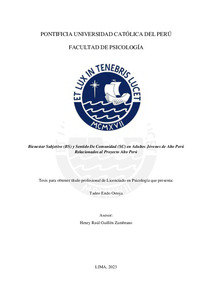| dc.contributor.advisor | Guillén Zambrano, Henry Raúl | |
| dc.contributor.author | Endo Ostoja, Tadeo | |
| dc.date.accessioned | 2024-03-26T18:47:36Z | |
| dc.date.available | 2024-03-26T18:47:36Z | |
| dc.date.created | 2023 | |
| dc.date.issued | 2024-03-26 | |
| dc.identifier.uri | http://hdl.handle.net/20.500.12404/27386 | |
| dc.description.abstract | La evidencia empírica constata la relevancia del colectivo en la construcción del bienestar de
los jóvenes pertenecientes a entornos de vulnerabilidad social. El presente estudio aborda las
relaciones entre el Bienestar Subjetivo (BS) y el Sentido de Comunidad (SC) en una muestra
de adultos jóvenes, hombres y mujeres entre los 18 y 35 años, residentes del A.A.H.H Alto
Perú, quienes hayan sido partícipes del Proyecto Alto Perú (N=12). Se implementó un abordaje
cualitativo, a través de la entrevista semiestructurada, siguiendo el método de análisis temático.
Como resultados principales, se encontró 3 ejes principales que construyen el BS de los jóvenes
del barrio: el dominio intrasujeto, el dominio material y el dominio relacional. En la evaluación
de las dimensiones del SC, resaltó la valoración de la Conexión emocional. En cuanto al efecto
del SC formado en Alto Perú sobre el BS, se encontró que favorece las relaciones positivas,
brinda un entorno satisfactorio y facilita el desarrollo del autoconcepto. Por último, utilizando
el criterio de densidad, la incidencia del Proyecto Alto Perú en el BS se manifestó en el
surgimiento de modelos de referencia positivos, la facilitación del desarrollo comunitario y en
la ampliación de redes y contactos. Dentro de las conclusiones, resalta que la Membresía y la
Conexión emocional tendrían una mayor incidencia sobre el BS de los jóvenes; así como que
la pertenencia al Proyecto Alto Perú fomenta una diferencia importante en cómo se concibe el
SC y su relación con el BS. | es_ES |
| dc.description.abstract | The empirical evidence proves the relevance of the collective in the conception of well-being
among young adults that belong to social vulnerability environments. The present study
approaches the relationship between Subjective Well-Being (SWB) and Sense of Community
(SoC) among a sample of young adults, men and women between 18 and 35 years old,
neighbors of Alto Peru who have been participants of the Proyecto Alto Peru (N=12). It
followed a qualitative method, using the semi structured interview and following the thematic
analysis. As main results, it was found 3 main axis that explain the construction of the SWB of
the young adults of the neighborhood: the intrasubject domain, the material domain and the
relational domain. Following the evaluation of the SoC, the Emotional Connection highlighted
amongst the other dimensions. In terms of the impact of Alto Peru´s SoC over SWB, it was
found that it favors positive relationships, provides a satisfactory environment and facilitates
the self-concept development. Finally, applying the density criterion, the incidence of the
Proyecto Alto Peru in the SWB can be explained by the appearance of positive models of
reference, facilitating community development and by the expansion of contacts and networks.
Inside the conclusions, highlights that Membership and Emotional Connection would have a
greater incidence over the SWB of these young adults; as well as the belonging to Proyecto
Alto Peru encourages a difference in how the SoC is conceived and its relationship with SWB. | es_ES |
| dc.language.iso | spa | es_ES |
| dc.publisher | Pontificia Universidad Católica del Perú | es_ES |
| dc.rights | info:eu-repo/semantics/openAccess | es_ES |
| dc.rights.uri | http://creativecommons.org/licenses/by-sa/2.5/pe/ | * |
| dc.subject | Adultos--Aspectos psicológicos | es_ES |
| dc.subject | Bienestar social | es_ES |
| dc.subject | Psicología comunitaria | es_ES |
| dc.title | Bienestar Subjetivo (BS) y Sentido De Comunidad (SC) en Adultos Jóvenes de Alto Perú Relacionados al Proyecto Alto Perú | es_ES |
| dc.type | info:eu-repo/semantics/bachelorThesis | es_ES |
| thesis.degree.name | Licenciado en Psicología | es_ES |
| thesis.degree.level | Título Profesional | es_ES |
| thesis.degree.grantor | Pontificia Universidad Católica del Perú. Facultad de Psicología | es_ES |
| thesis.degree.discipline | Psicología | es_ES |
| renati.advisor.dni | 47180603 | |
| renati.advisor.orcid | https://orcid.org/0000-0001-6574-8077 | es_ES |
| renati.author.dni | 76919367 | |
| renati.discipline | 313016 | es_ES |
| renati.juror | Guillen Zambrano, Henry Raul | es_ES |
| renati.juror | Tintaya Orihuela, Meir Alvaro | es_ES |
| renati.juror | Tavara Vasquez, Maria Gabriela | es_ES |
| renati.level | https://purl.org/pe-repo/renati/level#tituloProfesional | es_ES |
| renati.type | https://purl.org/pe-repo/renati/type#tesis | es_ES |
| dc.publisher.country | PE | es_ES |
| dc.subject.ocde | https://purl.org/pe-repo/ocde/ford#5.01.00 | es_ES |







